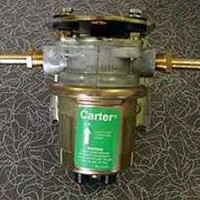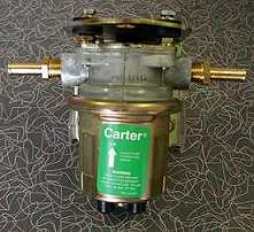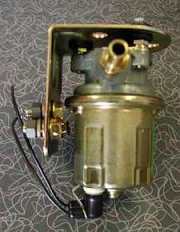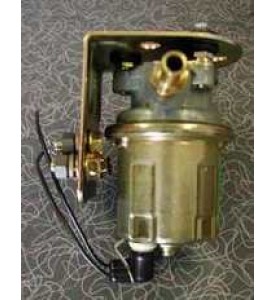Weber Specific Electric Fuel Pumps

Fuel Pumps and Fuel Pressure:
Fuel delivery is critical to the proper performance of any Weber carb. From a basic 32/36 DGEV to a set of Triple Sidedraft DCOE's. Webers rely on a stable full float bowl in order to mix the fuel and air correctly. Mechanical pumps very rarely do this. They pulse fuel instead of giving a smooth even delivery and the amount of fuel varies with engine RPM. A Proper Electric Fuel pump will give the best performance and most stable tuning for any Weber carb application. We use only High Volme and Low Pressure pumps. Webers work best at approx 4 psi of fuel pressure (Not 2 psi like many of the older books stated.) and you need Volume not Pressure to keep the float bowl full.We ONLY use the Carter Rotary pumps. They are High Volume (60-70 GPH) but only 4 psi. This is PERFECT for all Weber applications from a Single 32/36 DGV on a Truck, Jeep or Car to a Triple Sidedraft setup on a Road Race car making 300 HP...This pump DOES NOT and SHOULD NOT use a Pressure Regulator for any reason. That is why we use it...
Problem Pump and Regulator setups:
These are combinations that many of you are using and you could be experiencing problems because of it.
Holly Fuel Pumps with Regulator:
This is a very common combination and it has alot of problems. The pump puts out too much pressure so you have to buy a regulator for it. The Regulator is just a restrictor that inhibits flow. This causes a huge loss of Volume and overloads the pump causing alot of noise and premature failure. This results in the float bowl going low or empty under hard acceleration and causes cornering problems.
Facet Fuel Pump:
This is one of those little square pumps with the transistor mounted on top that make a ticking noise all the time. These pumps are TERRIBLE. No volume and High Pressure. These pumps have been sold for many years with Weber and Mikuni conversions and have cause many people alot of tuning problems. They are a pulse type pump that delivers almost no volume (usually less than the stock mechanical pump did) and usually at High Pressure. This cause flooding at idle and lean out conditions under high load. Do not use them....


Ignition Systems, Spark Output and Spark Advance:
This is a serious topic that seems to get ignored even by professional installers. The essence of a Weber conversion is that you are putting on a Larger carb that flows more fuel and Air to make more HP. Most older cars that are getting these carbs installed on them had very bad Point and Condensor Igntion systems with very low spark output. These systems were barely adequate for a stock carb let alone a performance upgrade. Adding even a single 32/36 carb to an old BMW, Opel, Etc will overload the stock ignitions systems capabilities. When you add Dual or Triple carbs you are really causing a problem. You are adding a bunch of extra Fuel and Air but not adding the extra fire needed to burn it properly. This results in jetting problems, rich running conditions, etc. If you are doing a conversion from a later model Fuel Injected car that had a decent Electronic Igntion system on it this will not be as much of a problem although you could have a problem with Spark Advance on these types of vehicles (Read below.)When doing a Weber conversion on an older Point type Ignition car it is a MUST to at least do an upgrade to Electronic Ignition with a higher output Coil and good wires and plugs. This will allow you to jet and tune the carb to its maximum HP and Fuel Economy potential. We use the Pertronix Ignition conversion on most vehicles ($89.00- $129.00) with the Bosch Red Coil ($45.00) and good plug wires and NGK SPark plugs. On dual and triple carb conversion we highly recommend the use of the MSD Spark Amplifiers with the Electronic Ignition. We offer these individually or in system packages like the Ultimate Spark Package we do for the BMW 2002. This will insure you have enough spark to burn all that extra fuel you are throwing at it. The difference in HP, Idle Quality, Cold Starts, and Fuel Economy are all very noticeable when doing the Ignition upgrades.
Spark advance is the other problem you are faced with. Most factory carb equipped cars have vacuum advance distributors. This is fine when installing a 32/36 or 38/38 because they have vacuum advance ports int the carb but when installing sidedrafts you do not have this option.
DO NOT hookup the distributor vacuum advance to the intake Manifold. That does not work and is a common mistake we see. If you do that you will pull full advance at idle then as soon as you open the throttle it loose vacuum and the timing will retard quickly causing a big stumble or flat spot and very bad throttle response.
When running Sidedrafts you need to either get a centrifugal advance distributor or leave your vacuum advance disconnected and just run more initial timing. You usually need 12-14 degress advance at 1000 RPM and 36 degrees total by 3000 RPM for the carbs to react properly. These timing numbers are baseline estimates only and can vary from car to car. You have to make sure you do not have a detonation problem from too much advance.

